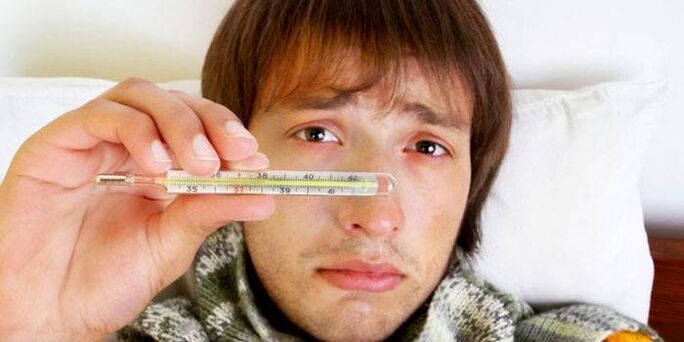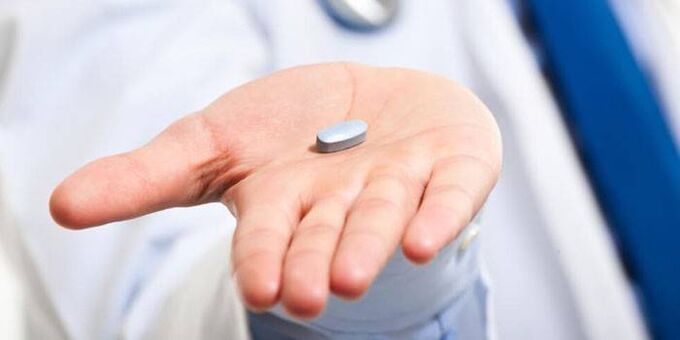Every second man of reproductive age (up to the age of fifty) is susceptible to such a delicate disease as acute prostatitis, in which, under the influence of several factors, the prostate gland (glandular)prostate) is inflamed, causing many forms of sexual dysfunction. function, fertility, and psycho-emotional state. Pay attention to what your body says, and don't ignore prompt treatment.
What is acute prostatitis?
If a man feels discomfort, even pain when urinating, he should see a doctor immediately, because acute prostatitis is an infectious disease that causes inflammation of the prostate gland, followed by swelling of the tissues. glands, forming foci of pus. up there. If you do not pay attention to the signs of acute prostatitis, the pathological process can turn into a chronic form that is very difficult to treat and the time to reflect is also very short - it takes place within a day or two.
However, there can be more serious complications than going into the chronic form. There is a risk of sepsis - a general infection of the blood and urinary tract infections that gradually increases with the development of pyelonephritis and cystitis. In these cases, the patient must be hospitalized urgently, the condition can be critical. Although a rare complication, sepsis can occur in immunosuppressed patients - intoxication, fever, severe symptoms, weakness. Therefore, blood cultures are needed to detect microorganisms.
Symptoms of acute prostatitis
Every man needs to know and remember the symptoms of acute prostatitis. General signs of the disease are manifested:
- Pain when urinating.
- Body poisoning.
- Urinary disturbances (intermittent, weak, straining).
- Frequent urge to go to the bathroom at night.
These are external symptoms of prostatitis, but on further investigation, white blood cells, traces of mucus and pus are found in the secretions of the prostate gland in the urine. When palpating, you will see a large, dense organization, and when you press it, you will feel pain. The further inflammatory process is characterized by heaviness and pain in the perineum, spreading to the penis, sacrum and rectum. As a result, the patient becomes difficult to empty the bladder and defecate due to the intense pain. Body temperature can rise up to 38°C.

Causes of acute prostatitis
Since this disease is inflammatory in nature, the following infectious agents are responsible for acute prostatitis:
- Gram negative - Klebsiella, E. coli, Proteus.
- Gram-positive - enterococci, staphylococci, streptococci.
- Urogenital infections - trichomonas, chlamydia, ureaplasmosis, gonorrhea, candida, mycoplasmosis.
As a rule, the microflora penetrates into the glandular tissue of the prostate gland through the lens (through the urethra and the excretory ducts of the prostate). In cystitis, the infection travels to the prostate gland from the bladder. Other possible routes of bacterial entry are opened up during endoscopic manipulation (catheterization, urethral repositioning, cystoscopy, urethroscopy). Pathogenic microorganisms migrate into the prostate from distant pathogens in dental caries, sinusitis, tonsillitis, cholecystitis, pyoderma, bronchitis.
There is a high chance of getting an infection from the intestines with enteritis, fissure hemorrhoids, colitis. Non-infectious factors that can trigger an attack of prostatitis are venous congestion (congestion) in the pelvic region and impaired ability of the gland to drain acini. Obstruction can be caused by irregular sexual activity or vice versa, excessive sexual activity, interruption of sex relationships, sedentary lifestyle, frequent constipation, frequent drunkenness, varicose veins of the frame. Small pots, hypothermia.
Acute forms of prostatitis
The clinical development of this disease is considered in three stages, which are simultaneously the forms of acute pancreatitis. This is:
- The first stage is the catarrhal form.
- The second stage is the follicular form.
- The third stage is the parenchymal form.
Acute prostatitis in men begins with catarrhal inflammation, which is characterized by enlargement of the acini, the appearance of edema of the glandular tissue and, as a result, an increase in the size of this organ. The excretory ducts of the prostate gland, which open into the posterior urethra, are actively involved in the inflammatory process. The lobules and ducts of the prostate are inflamed, their contractility is disturbed, they are narrowed and blocked, which can make it difficult to secrete the prostate gland.
At the catarrhal stage, the pathological process stops in the mucosal layers and does not go deeper. As it progresses, the disease will spread to the entire prostate gland. Acute bacterial prostatitis develops in a cystic form. When analyzed in the urine pus comes out into the light. The tissue of the destroyed gland changes, the swelling continues to increase. The cystic form is still relatively easy to treat.
Moreover, a parenchymal form of the disease develops, the result of which can be an abscess of the prostate, that is, chronic prostatitis. Therefore, symptoms such as:
- Raise your body temperature by 39°C or more.
- Manifestations of intoxication: weakness, chills, thirst, loss of appetite.
- The frequent need to go to the bathroom for small needs is accompanied by sharp pain.
- Inability to empty the bladder.
- Bloating.
- Tenesmus.
- Constipation.
- Mucus discharge from the anus.

Diagnosis of acute prostatitis
When you first suspect you have prostatitis, see your doctor promptly. A correct and comprehensive diagnosis of acute prostatitis is critical for prompt and successful treatment. First, the doctor will analyze the medical history, clarify the time of onset of pain in the perineum, increase or decrease during ejaculation, urination, and defecation. Certainly, the doctor must study the patient's medical history: what diseases have been transferred, whether there is a sexually transmitted infection or not.
The urologist will palpate the external genitalia to identify developmental pathologies, conspicuous signs of prostatitis, rectal examination - palpate the prostate through the anus. To create a complete clinical picture, it is necessary to undergo the following examinations:
- Urinalysis to determine the level of white blood cells and the presence of pus fibers.
- Blood tests.
- Culture smear - the contents and scraps of the urethra are taken to determine the growth of bacteria and their sensitivity to antibiotics.
- Determination of urine velocity (uroflowmetry).
- Prostate ultrasound to detect diffuse changes in the gland and its abscess formation.
- Blood tests to determine the presence of pathogens of diseases such as syphilis, gonorrhea, mycoplasmosis, chlamydia.
- PCR diagnostics.
Treatment of acute prostatitis
After a thorough diagnosis, they began treatment for acute prostatitis. It is based on antibiotic therapy, the purpose of which is to stop infectious pathogens. In addition, conservative treatment of prostatitis includes the use of:
- Anti-inflammatory drugs.
- Means improved blood circulation.
- Pain reliever and antispasmodic.
- The drug supports the metabolism of the prostate gland.
- Multivitamins.
- Botanical therapeutic agents.
- Immunosuppressive drugs.
Progressive forms of prostatitis with the appearance of foci of pus require surgical intervention. Transurethral (through the urethral wall) or rectal (through the anal wall) drainage of the abscessed areas is performed. Surgery may be required in case of pathological urinary retention. An episiotomy is performed - an incision is made in the abdominal cavity into which a tube is inserted to divert urine.

drug
Treatment of acute prostatitis in men with drugs (tablets, injections) is the basis of successful therapy. With well-prescribed antibiotic therapy, the infection can be cleared up in a few days. However, treatment should be continued for four weeks to achieve complete eradication of the pathogenic microflora. The drugs used in the disease are:
- Etiotropic (antibiotic) - destroys pathogens.
- Hereditary diseases (NSAIDs) - remove blockages in the prostate gland.
- Symptoms (analgesic, antipyretic) - pain relief, organ spasms and other symptoms.
To treat prostatitis, your doctor may prescribe a variety of medications, including:
- Injection - contributes to the short-term penetration of the drug into the tissues of the body.
- Candles (rectal) - analgesic, antibacterial effect.
- Injectable - delivery of the drug to the prostate gland through the urethral opening.
- Microclyster with decoction of herbs.
- Antibacterial drugs have a broad spectrum of action, if the specific causative agent cannot be identified.
Antibiotics for acute prostatitis
The main causative agent of prostatitis is pathogenic bacteria that cause inflammation in the tissues of the prostate gland. Therefore, antibiotics for acute prostatitis are the basis for treatment and are prescribed only after checking the sensitivity of the microflora. Antibiotics used for inflammation are divided into the following groups:
- Fluoroquinolones.
- Penicillin.
- Cephalosporins.
- Macrolite.
- Tetracyclines.
- Aminoglycosides.
Prevention of acute prostatitis
For men to stay healthy and full, the prevention of acute prostatitis is very important, including:
- Normal sex life with a normal partner, excluding casual relationships.
- Use condom.
- Stop smoking, drugs, alcohol.
- Proper nutrition.
- personal hygiene.
- Annual preventive check-up at a urologist.
- Take vitamins and zinc preparations.
It is important to completely cure diseases of the genital organs (urethritis, cystitis, pyelonephritis, seminal vesicles). Untreated diseases can provoke the development of an inflammatory process in the prostate gland. Among other things, we must not forget about increasing physical activity. In the cold season, hypothermia should be avoided. Prostate massage is very useful for men's health. However, if the disease is already spontaneous, then massage is contraindicated and even impossible because the organ is aching.



























